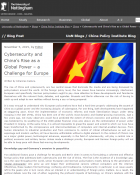It is easy enough to understand why European policymakers have had a hard time properly addressing the ascent of China as a global power and the increasing ubiquity of cyberspace. For one thing, both developments have happened at staggering pace. Since the implementation of economic reforms and trade liberalization begun under Deng Xiaoping in the late 1970s, China has been one of the world’s most dynamic and fastest-growing economies. Just a few years ago, not many observers would have predicted the extent of China’s economic and political clout, which was bolstered by its weathering of the 2008 global financial crisis and, above all, the centralization of power under President Xi Jinping. At the same time, it is almost impossible to grasp the speed and extent to which our lives have been transformed by the omnipresence and interconnectedness of computers and internet-enabled devices. From human interaction to industrial production and from commerce to control of critical infrastructures as well as to espionage and modern warfare, all have become unthinkable without a digital element. In the context of China’s rise as a major global power, technological advances, especially in the field of cybersecurity, will play a central role in political, economic and military terms. Unless made a strategic priority, European and German foreign policy will not be able to keep pace with these fast-moving developments.
Knowledge gap and Germany’s aversion to geopolitics
Two additional factors pose a challenge for Brussels and Berlin when it comes to formulating a coherent and effective foreign policy that addresses both cybersecurity and the rise of China. The first is the existence of a knowledge gap. As is the case throughout the world, senior European and German policymakers mostly belong to the generation of“digital immigrants” who grew up and began their professional careers without computers and the internet. Oftentimes, these leaders find technology confusing and troublesome. Cybersecurity in particular is an issue usually left to the geeks who in turn rarely show an interest in or understanding of foreign policy matters. As a result, the political debate runs the risk of either neglecting the profound impacts of technology on China’s relations with the West or, alternatively, becoming dominated by exaggerated fears of “cyber armageddon.”
The third problem is the EU’s and especially Germany’s failure to adequately address the rise of China and America’s response to this event in geopolitical terms. While it is debatable how effective the Obama administration’s “pivot to Asia” has been thus far, Washington can be credited with making China’s ascendance one of its declared priorities. The EU and Germany have failed to do so, in part due to their preoccupation with the effects of the euro crisis and the war in Ukraine. To be sure, the EU’s and especially Germany’s relationships with China are very different from Sino-American relations, which are marked by an awkward combination of increasing economic interdependence and an intensifying rivalry in the security arena. Unlike the US and China, the EU and Germany do not have their own agendas related to the regional security architecture of the Asia-Pacific. Rather, it is clearly in Brussels’ and Berlin’s interest to stress partnership and economic cooperation with both Beijing and Washington. However, to maintain a smooth relationship with their two most important (non-EU) trading partners in the long run and to help stabilize the Asia-Pacific region, the EU and especially Germany should not shy away from addressing security concerns of all involved countries. In this regard, cybersecurity, cyberespionage and fear of cyberwar are core issues of the geopolitical debate.
Washington’s cyber deterrence strategy
To understand the importance of cybersecurity in the context of China’s rise as a global power, it is indeed helpful to look at US-China relations and the two countries’ approaches to issues of cyberspace. In late September, during the Chinese president’s visit to Washington, Xi and Obama announced that they would work together to curb cyberattacks. However, the statement could hardly mask the increase in tensions between Washington and Beijing, not least due to confrontations in cyberspace. In early June, just a couple months prior to the summit, the Obama administration announced a hacker attack that apparently originated in China and compromised the security of data of at least four million government employees. That incident was actually only the latest case in a long history of accusations and counter-accusations. In May 2014, US-Chinese exchanges over cybersecurity reached a low point when a grand jury indicted five members of the Chinese People’s Liberation Army (PLA), charging them with industrial espionage against American firms. As Washington sees it, it is clear that Beijing is a major cyberadversary that engages in ongoing campaigns of cyberintrusions directed at the US government, the military and the private sector. The Pentagon’s new strategy for cyberwar, announced by Defense Secretary Ashton B. Carter in late April, is intended to deter such behavior by threatening to use cyberweapons in response to certain cyberattacks. Washington hopes that, with the help of Silicon Valley, it will be able to maintain America’s advantage in the cyber domain in both economic and military terms.
Cybersecurity as a strategic priority of the CCP
China routinely denies American allegations and portrays itself as a victim of cyberattacks. Beijing points to the information provided by former NSA-contractor Edward Snowden whose 2013 revelations showed that the US had its own sophisticated surveillance program targeting the Chinese. Under Xi Jinping cybersecurity has been made a strategic priority and several high-level Leading Groups and Leading Small Groups under the direct supervision of the president have been created. China’s cyberstrategy is best understood if seen against the backdrop of Beijing’s paramount objective of keeping the Chinese Communist Party (CCP) in power. In fact, while the US and Europe discuss cybersecurity mainly in terms of technical threats, China focuses first and foremost on information control and ideological threats as regards its domestic “netizens.”
On the economic side, Beijing is trying to maintain growth and promote its domestic IT sector with the objective of becoming a global leader in the digital markets. This approach is linked to Beijing’s broader strategy, dubbed “Made in China 2025.” Announced earlier this year, the initiative is inspired by Germany’s “Industry 4.0” approach and is aimed at comprehensively upgrading Chinese industry. Meanwhile, Chinese military planners are considering cyberspace as an essential field of espionage and military modernization, potentially giving Beijing a highly effective means in asymmetrical warfare. In short, Beijing’s cybersecurity strategy includes political, economic, and military aspects and is driven by the overall objective to strengthen China’s rise as a global power under the leadership of the CCP.
Toward a balance of power in the cyber domain
At a time of increased Sino-American competition and mutual mistrust in the cyber domain, the EU and especially Germany should step into the debate. Brussels and Berlin should stress the fact that all powers have a vested economic interest in an open, functioning internet. Rather than getting bogged down in protracted discussions about internet governance, the objective should be to create a carefully calibrated balance of power in which all stakeholders practice self-constraint and limit aggressions in cyberspace to a somewhat acceptable level, lest they face dire economic consequences. While the EU and Germany should emphasize the mutual benefits of economic interdependence and highlight that China has been a major beneficiary of globalization and technology-based interconnectedness, policymakers in Brussels and Berlin first need to realize that discussions about cyberspace cannot be held without addressing the implications for the security arena. Instead of turning a blind eye to geopolitics, Brussels and Berlin should see the debate about cybersecurity as a welcome opportunity to promote the peaceful rise of China.
This piece was originally published a s ablog entry for the University of Nottingham's China Policy Institute Blog.

